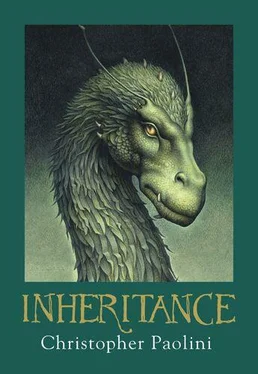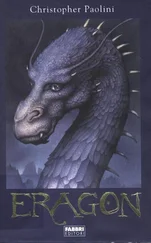When they departed, Saphira was the one who suggested a change of path. She did not have to try very hard to convince Eragon; he was happy to agree once she explained that the side trip would not take too long.
From Ceunon, Saphira flew westward, across the Bay of Fundor: a broad, white-capped expanse of water. The gray and black humps of great sea-fish often breached the waves, like small, leathery islands. Then they would spray water from their blowholes and lift their flukes high into the air before slipping back into the silent depths.
Across the Bay of Fundor, through winds cold and blustery, and then across the mountains of the Spine, each of which Eragon knew by name. And thus to Palancar Valley for the first time since they had set off in pursuit of the Ra’zac, along with Brom, what seemed like a lifetime ago.
The valley smelled like home to Eragon; the scent of the pines and the willows and the birches reminded him of his childhood, and the bitter bite of the air told him that winter was near.
They landed in the charred ruins of Carvahall, and Eragon wandered along streets fringed with encroaching grass and weeds.
A pack of wild dogs trotted out of a nearby stand of birch. They stopped when they saw Saphira, then snarled, yelped, and ran for cover. Saphira growled and loosed a puff of smoke but made no move to chase them.
A piece of burnt wood cracked under Eragon’s foot as he dragged his boot through a pile of ashes. The destruction of the town left him saddened. But most of the villagers who had escaped were still alive. If they returned, Eragon knew that they would rebuild Carvahall and make it better than it had been. The buildings he had grown up with, though, were gone forever. Their absence exacerbated his feeling that he no longer belonged in Palancar Valley, and the empty spaces where they ought to have been left him with a sense of wrongness, as if he were in a dream where everything was off-kilter.
“The world is out of joint,” he murmured.
Eragon built a small campfire next to what had been Morn’s tavern, and he cooked a large pot of stew. While he ate, Saphira prowled the surrounding landscape, sniffing at whatever she found interesting.
When the stew was gone, Eragon carried his pot, bowl, and spoon to the Anora River and washed them in the icy water. He sat squatting on the rocky shore and stared at the drifting white plume at the head of the valley: the Igualda Falls, which stretched upward for a half mile before disappearing over a shoulder of stone high on Narnmor Mountain. Seeing it brought back the evening he had returned from the Spine with Saphira’s egg in his pack, knowing nothing of what lay before the two of them, or even that there would be two of them.
“Let’s go,” he said to Saphira, rejoining her by the caved-in well in the center of the town.
Do you want to visit your farm? she asked as he took his place on her back.
He shook his head. “No. I would rather think of it as it was, not as it is.”
She agreed. However, by unspoken consent she flew south following the same path as when they had left Palancar Valley. Along the way, Eragon glimpsed the clearing where his home had been, but it was distant and obscure enough that he was able to pretend that perhaps the house and barn were still intact.
At the southern end of the valley, Saphira rode a pillar of rising air up to the top of the huge, bare mountain, Utgard, where stood the crumbling turret the Riders had built to keep watch over mad King Palancar. The turret had once been known as Edoc’sil, but now bore the name Ristvak’baen, or the “Place of Sorrow,” as it was there that Galbatorix had slain Vrael.
In the ruins of the turret, Eragon, Saphira, and the Eldunari with them paid their respects to the memory of Vrael. Umaroth in particular was somber, but he said, Thank you for bringing me here, Saphira. I never thought to see the place where my Rider fell .
Then Saphira spread her wings and leaped out of the turret and soared away from the valley and over the grassy plains beyond.
Halfway to Ilirea, Nasuada contacted them through one of the Varden’s magicians and ordered them to join a large group of warriors she had sent to march from the capital to Teirm.
Eragon was pleased to learn that Roran commanded the warriors and that among their ranks were Jeod, Baldor-who had regained full use of his hand after the elves reattached it-and several more of the villagers.
Somewhat to Eragon’s surprise, the people of Teirm refused to surrender, even after he released them from their oaths to Galbatorix, and even though it was obvious that the Varden, with Saphira and Eragon to help, could easily capture the city if they wished. Instead, the governor of Teirm, Lord Risthart, demanded that they be allowed to become an independent city-state with the freedom to choose its own rulers and set its own laws.
In the end, after several days of negotiations, Nasuada agreed to his terms, provided that Lord Risthart swore allegiance to her as high queen, even as King Orrin had, and consented to abide by her laws concerning magicians.
From Teirm, Eragon and Saphira accompanied the warriors south, along the narrow coast, until they arrived at the city of Kuasta. They repeated the process from Teirm, but unlike Teirm, the governor of Kuasta yielded and agreed to join Nasuada’s new kingdom.
Then Eragon and Saphira flew alone to Narda, far to the north, and extracted the same promise from them before finally returning to Ilirea, where they stayed for some weeks in a hall next to Nasuada’s.
When time allowed, he and Saphira left the city and went to the castle, where Blodhgarm and the other spellcasters guarded the Eldunari rescued from Galbatorix. There Eragon and Saphira aided in the effort to heal the minds of the dragons. They made progress, but it was slow, and some of the Eldunari responded faster than others. Many of them, Eragon worried, simply did not care about life anymore, or were so lost within the labyrinths of their minds that it was almost impossible to communicate with them in a meaningful manner, even for the elder dragons such as Valdr. To prevent the hundreds of maddened dragons from overwhelming those who were trying to help them, the elves kept most of the Eldunari in a trancelike state, choosing to interact with only a few at a time.
Eragon also labored alongside the magicians of Du Vrangr Gata to empty the citadel of its treasures. Much of the work fell to him, as none of the other spellcasters had the knowledge or experience needed to deal with many of the enchanted artifacts Galbatorix had left behind. But Eragon did not mind; he enjoyed exploring the damaged fortress and discovering the secrets that lay hidden therein. Galbatorix had collected a host of wonders over the past century, some more dangerous than others, but all of them interesting. Eragon’s favorite was an astrolabe that, when put to his eye, allowed him to see the stars, even in daylight.
He kept the existence of the most perilous artifacts a secret between him, Saphira, and Nasuada, deeming it too risky to allow knowledge of them to spread.
Nasuada put the trove of riches they recovered from the citadel to immediate use feeding and clothing her warriors, as well as rebuilding the defenses of the cities they had captured during their invasion of the Empire. In addition, she gave a gift of five gold crowns to every one of her subjects: a trifling amount to the nobles, but a veritable fortune to the poorer farmers. The gesture, Eragon knew, earned her their respect and allegiance in a way Galbatorix would never have understood.
They also recovered several hundred Riders’ swords: swords of every color and shape, made for both humans and elves. It was a breathtaking find. Eragon and Saphira personally carried the weapons to the castle where the Eldunari were, in anticipation of the day when they would again be needed by Riders.
Читать дальше





![Christopher Paolini - Brisingr [en]](/books/195528/christopher-paolini-brisingr-en-thumb.webp)
![Christopher Paolini - Eldest [en]](/books/223279/christopher-paolini-eldest-en-thumb.webp)
![Christopher Paolini - Eragon [en]](/books/248440/christopher-paolini-eragon-en-thumb.webp)




